COP27: if not now, when?
As the disappointing results of the 27th Climate Change Conference of the Parties (COP27) dominate the headlines, POLIS warns that systematically including the voices of cities and regions is a prerequisite, if we do not want to risk jeopardising our climate goals. To reflect on this, we spoke with the Karen Vancluysen, POLIS' Secretary General, about global collaboration, ensuring a Just Transition, and how innovation can support our cities and regions.
Last year, the UK hosted the 26th UN Climate Change Conference of the Parties (COP26). Held in POLIS member city Glasgow, delegates discussed how to accelerate action towards the goals of the Paris Agreement and the UN Framework Convention on Climate Change.
Transport was high on the agenda, as road transport accounts for 10% of global greenhouse gas emissions, rising faster than those of any other sector. If we are to achieve the carbon neutrality goals we have set ourselves, mobility must be placed front and centre.
This is a given, but perhaps a more pressing concern now is whose voices are heard in this conversation. Every year since 1995 the United Nations has brought together 190 countries at COP to agree on how to tackle climate change. For too long, key voices have been – and continue to be – absent from the table. Of course, we are talking about cities. COP27, held in Sharm El-Sheikh this year, presented a real opportunity to rectify this imbalance.
POLIS' Secretary General, Karen Vancluysen, explains how cities and regions are rising to the climate crisis, how and why national and local leaders must collaborate, and why POLIS has written to the COP calling on the parties to take action now.
POLIS: Why are cities and regions so important in our fight again climate change?
Karen (Vancluysen): Cities are where we will win or lose the battle against climate change. Today, 55% of the world’s population lives in urban areas, a proportion expected to increase to 68% by 2050. With urban passenger transport already counting for nearly a third of transport emissions, our cities need to be ready.
Yet, at the same time, cities are where some of the boldest action is taking place. From major street space reallocation in favour of active travel to vehicle access regulations, they are at the forefront of the transformative changes tackling our climate emergency demands.
Karen Vancluysen
Karen Vancluysen is Secretary General at POLIS since September 2014, after having been the network's Research Director for 8 years. Since 1998, she has been involved in urban mobility networking, innovation, and policy activities as well as a wide range of European urban transport research projects
POLIS: How can we ensure their voices are heard in international dialogues like COP27?
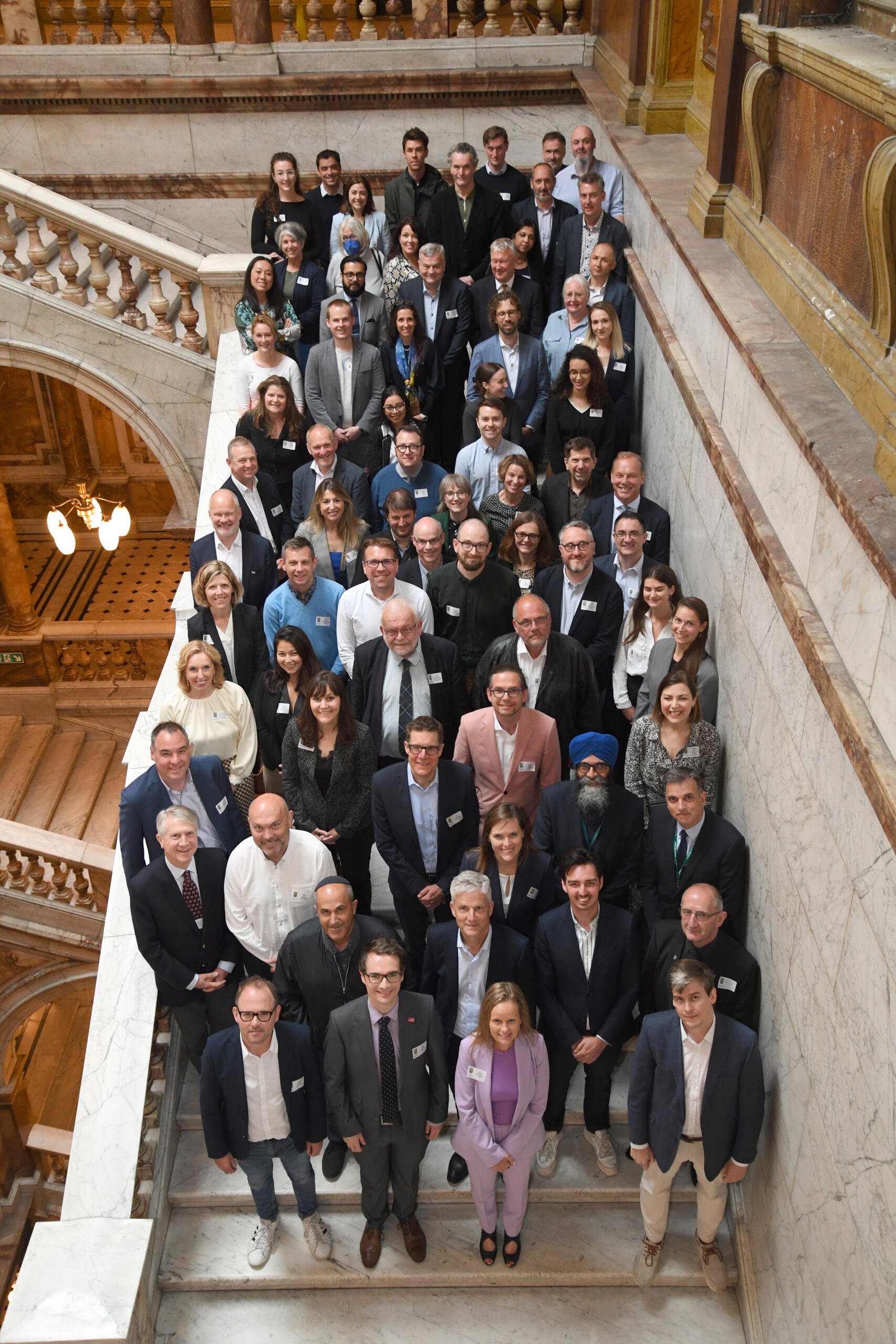
City and regional representatives assemble in Glasgow. Credit: Glasgow City Council
Karen: Moving forward means listening to local leaders, understanding their challenges, and helping them respond. When it comes to COP, national and international politicians lead the discussions, but it is critical to ensure local and regional governments also have a seat at the table.
This is why POLIS has penned a letter to the COP Presidency, calling for COP27 to highlight the importance of accelerating the shift to sustainable urban mobility, to acknowledge the key role of local and regional governments in reaching climate goals, and to address their needs and support their work.
Cities and regions are ready to support their national and international decision-makers, but also need to be empowered by them to do so.
POLIS: Are cities ready? What are they doing?
Karen: Yes! This became clear once again earlier this year, when POLIS and the city of Glasgow jointly hosted a Leadership Summit to address the transition to zero-emission and the decarbonisation of transport, and move from ambition to action.
The feeling was perhaps best summarised by Wiebke Pankauke, Deputy Head of Unit for Future Urban and Mobility Systems at DG Research & Innovation, when she said, 'It will be all hands on deck if we are to go further, at all levels of government – the EU, cities, start-ups, commuters… everyone!'
From Bristol to Madrid, Leuven to London – leading politicians, decision-makers researchers, advocates, and entrepreneurs from across the transport sector in Europe discussed sustainable, safe, innovative, and inclusive transport.
The impetus for clear, comprehensive, and just action was palpable. London’s low-emissions zones, Gipuzkoa’s equitable public transit ticketing, and Catalonia’s on-demand bus services - these are some of the solutions that show that action is occurring. The tasks now are acceleration and expansion, but for these, local leaders urgently need support from national and international partners.
POLIS: True, but this will be a long journey. What about the political will in the cities? Action requires strong leadership: do our cities have this too?
Karen: Again – yes! We saw this at our Political Group summit in Paris in March. Representatives from several POLIS members – including 25 deputy mayors, regional ministers, and secretaries of state for mobility – sat down to share and learn about the path to a cleaner, greener, and more inclusive urban mobility.
It was clear the desire for change is present across the board – from our capitals to smaller and medium-sized cities all declaring their commitment to reallocating space towards more sustainable transport, implementing active travel infrastructure, and adjusting urban freight flows. Our political leaders are not afraid to take bold action and are aware they will need to combine carrots with sticks.
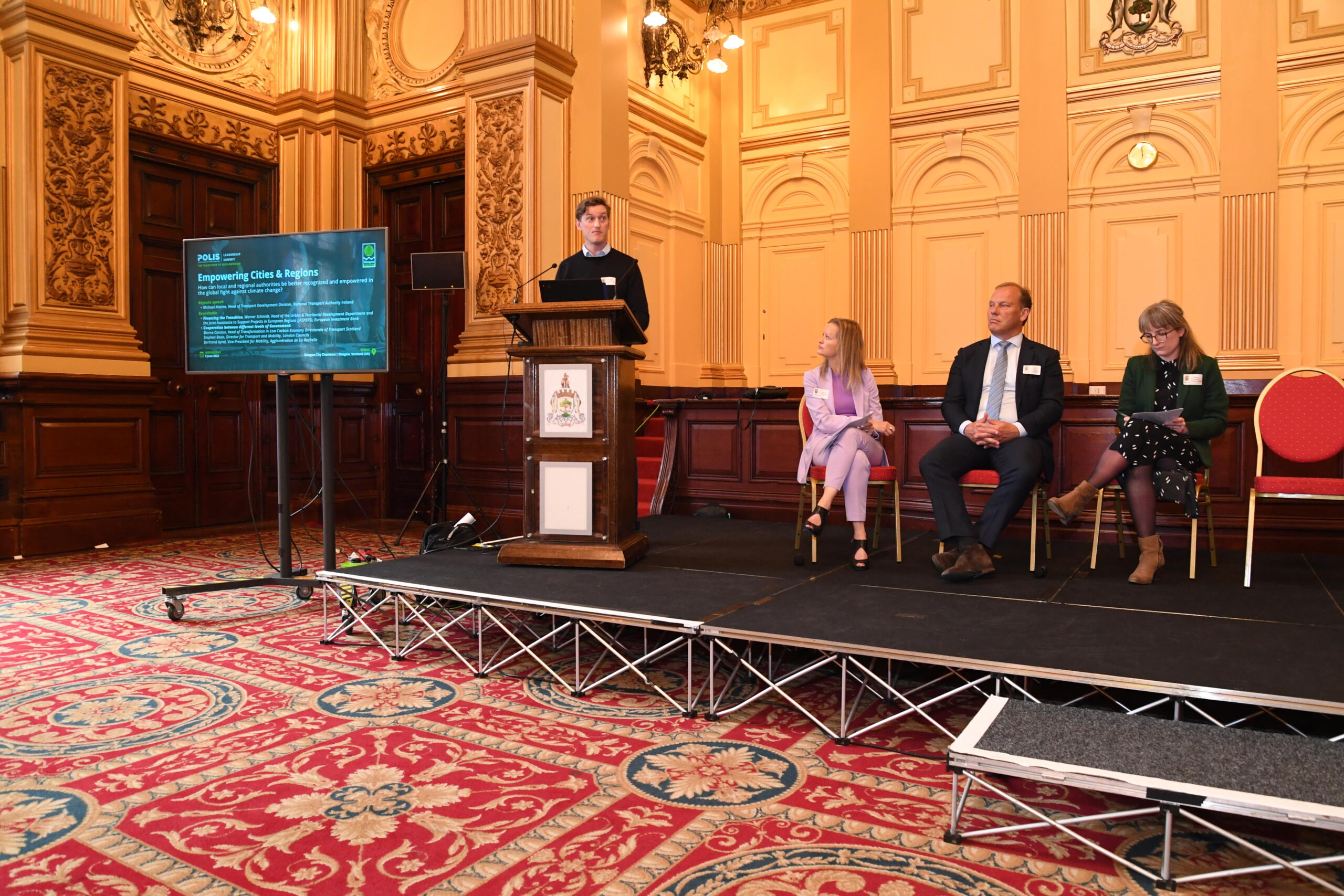
London's Deputy Mayor, Seb Dance addresses the Glasgow Summit. Photo credit: : Glasgow City Council
POLIS: How are cities taking on the “justice” aspect of sustainable mobility?
Karen: A sustainable transition must be a just transition. Electrification, mechanisation, and automation are vital, but they cannot overlook the heart of our urban mobility systems: people and urban life.
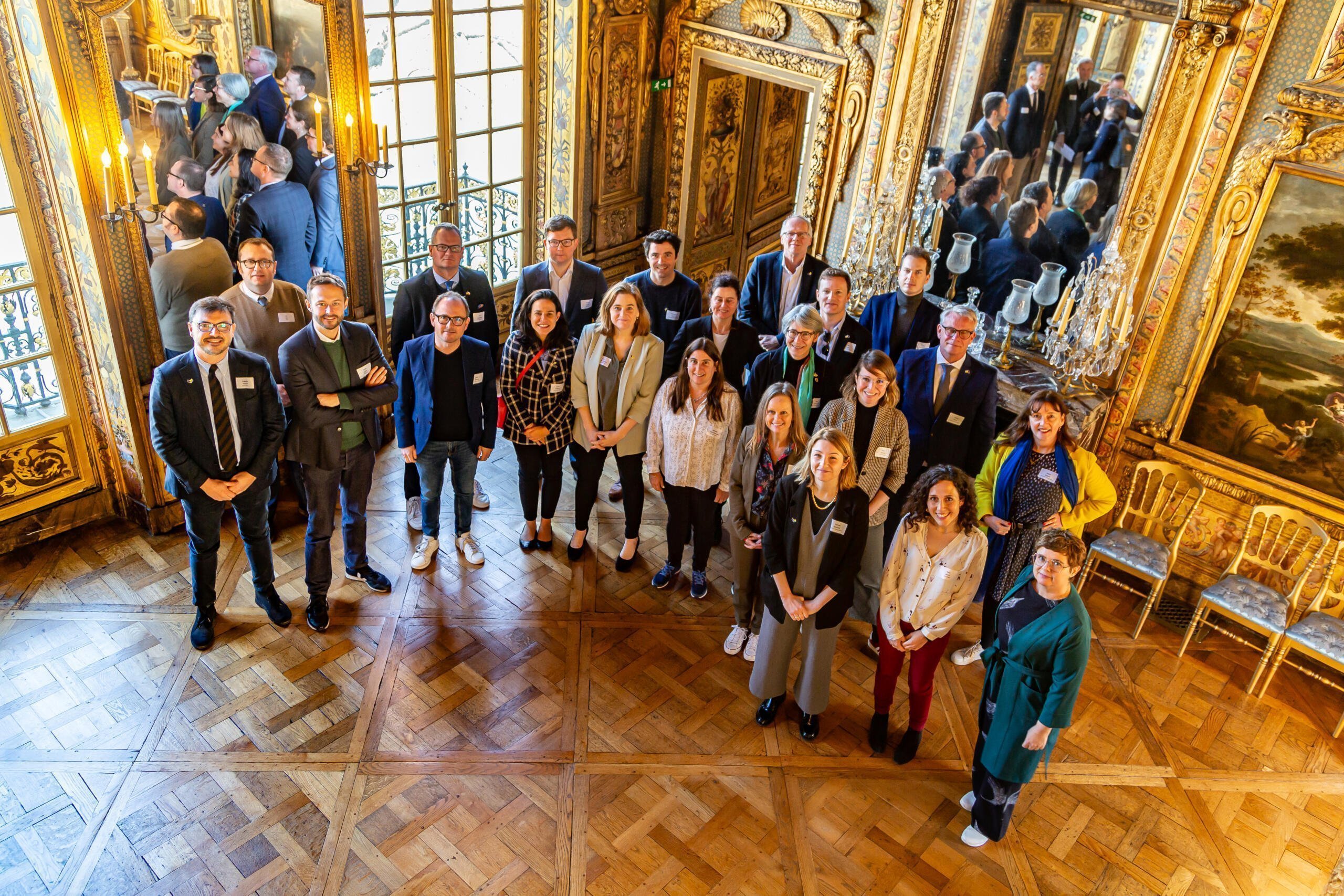
Local decision makers meet at POLIS’ Political Group Meeting in Paris this year. Credit: Victoire Duhot / Autonomy
Affordability, accessibility, and availability of services, irrespective of gender, citizenship, race or sexuality is non-negotiable and, as every politician worth their salt knows, key to ensuring socially and politically viable decision-making.
In Glasgow, this was echoed by Rafaela Romero, Deputy Mayor of Gipuzkoa – a POLIS member city with fast-expanding transport provisions for vulnerable user groups.
'Transport is the key link between opportunities and the resources available to citizens to make use of them,' she asserted, 'It is therefore essential for the public sector to guarantee a fundamental right to mobility.'
This commitment to fairness is at the heart of POLIS’ Just Transition Agenda, which lays out the need to recognise and better understand the current imbalances and unfairness and establish inclusive governance approaches.
POLIS: We talk a lot about innovation, but how can political leaders know what innovative solutions work and toward what direction our R&I should be heading?
Karen: It is local and regional authorities who hold the keys to advancing the transition on the ground. However, to do this effectively, they need targeted and policy-responsive research and innovation, supporting the implementation of priorities in a fair, efficient, and effective way.
Fostering cooperation between academia and local authorities is key, and POLIS hosts many members amongst leading European universities and knowledge institutes, bringing them together to explore how to turn research into action on the ground.
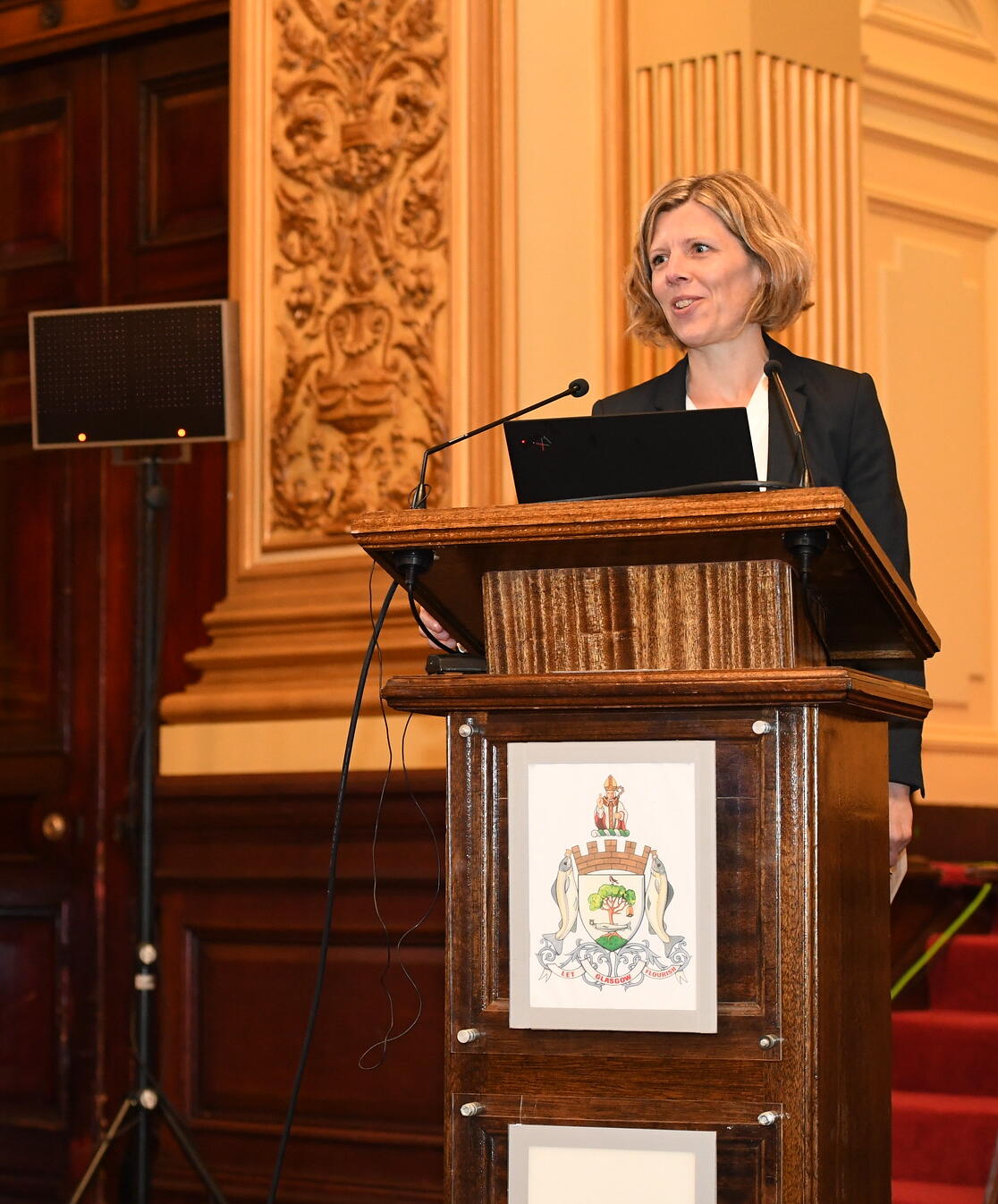
Wiebke Pankauke, Deputy Head of Unit for Future Urban and Mobility Systems at DG Research & Innovation. Credit: Glasgow City Council
We also invest a lot in facilitating a dialogue between our members and the industry, through our urban freight dialogue with the Alliance for Logistics Innovation through Collaboration in Europe ALICE, and our ongoing exchange with new mobility service operators, our involvement in the European Road Transport Research Advisory Council.
What we need is technology that supports policy goals and does not undermine these. This requires active public oversight and the governance of innovation, with agile regulatory frameworks that maximise opportunities offered by new technologies and solutions coming from the private sector, and a watchful eye to mitigate unavoidable negative externalities.
As we move forward with a focus on carbon reduction, we need strategies which aid this agenda and do not prove counter-productive!
POLIS: Why is COP27 an important moment for this conversation?
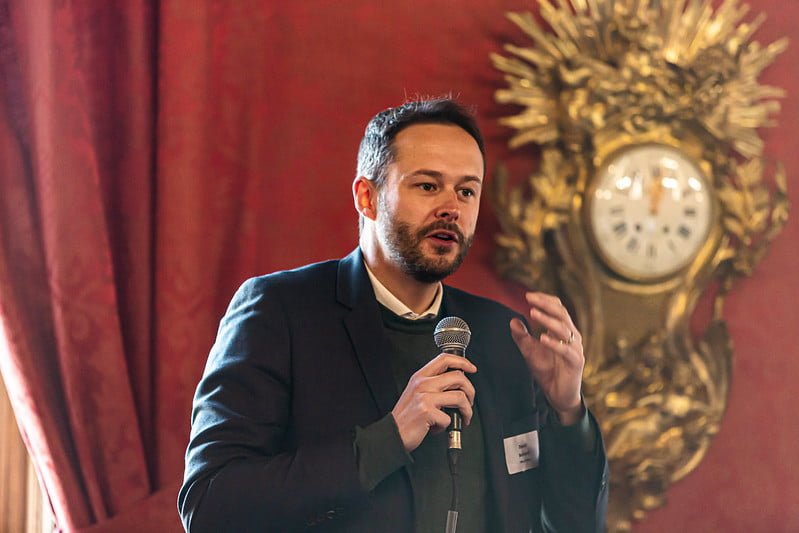
Paris' Deputy Mayor, David Belliard addresses the Political Group Meeting. Credit: Victoire Duhot / Autonomy
Karen: At COP, national and international decision-makers assemble to determine the trajectory of our climate action. The prominence given to cutting transport emissions at COP26 last year demonstrated governments recognise the significance of mobility in our climate transition.
Now, one year on, we must go further. This year we are also facing the short-term challenges created by Russia’s invasion of Ukraine alongside the continually warming climate. It is time to not just diversify our fuels, but our approach to governance, bringing in new voices and expertise that have not yet been given the floor in a meaningful way.
Click here to read the article in its original format.
About the authors
Isobel Duxfield is Communications and Membership Manager at POLIS. She completed her MPhil in Gender Studies at the University of Cambridge where she researched gender and cycling. Isobel manages the SUM4All project and has published academic work on gender and active mobility, and domestic violence prevention.
